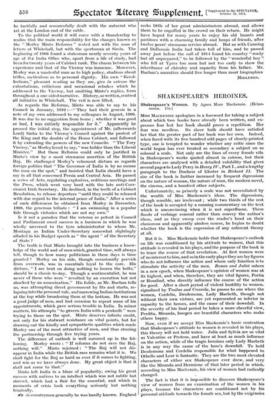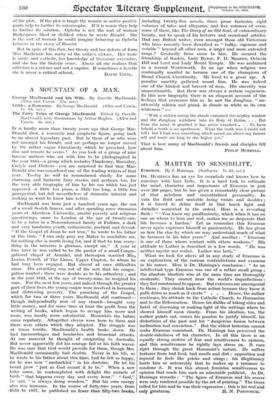SHAKESPEARE'S HEROINES.
MISS MACKENZIE apologizes in a foreword for taking a subject about which two books have already been written, and ex- presses fear lest her book should prove a repetition. Her fear was needless. Its sheer bulk should have satisfied her that the greater part of her book was her own. Indeed, when faced with its five hundred odd pages of closely-printed type, one is tempted to wonder whether any critic since the world began has ever treated so secondary a subject on so colossal a scale. Not only are the lines of every female role in Shakespeare's works quoted almost in extenso, but their characters are analysed with a detailed volubility that gives several pages to Lady Percy in Henry IV., Part I., and a lengthy paragraph to the Duchess of Gloster in Richard II. The size of the book is further increased by frequent digressions on the nature of woman, the nature of man, the modern novel, the cinema, and a hundred other subjects.
Unfortunately, so princely a scale was not necessitated by the wealth of Miss Mackenzie's ideas. The digressions, though sensible, are irrelevant ; while two thirds of the rest of the book is occupied by a running commentary on the text which is unconvincing when it is not superfluous. These floods of verbiage conceal rather than convey the author's ideas, and as they sweep over the reader's head on their clamorous and apparently aimless course, he begins to doubt whether the book is the expression of any coherent theory at all.
But it is. Miss Mackenzie holds that Shakespeare's outlook on life was conditioned by his attitude to women, that this attitude is revealed in his plays, and the purpose of the book is to trace the course of that revelation. At first women were of no interest to him, and so in the early plays they are lay figures who do not influence the action and whose only function is to stimulate the activity of the men. Romeo and Juliet ushers in a new epoch, when Shakespeare's opinion of women was at its highest, and when, therefore, they are vital figures, Portia or Rosalind, who directly influence the course of the action for good. After a short period of violent hostility to women. signalized by Troilus and Cressida, he passes to one where the women, Cordelia, Desdemoria, Lady Macbeth, though not without their own virtues, are yet represented as inferior in capacity to the heroes, and the cause of their downfall. In the severity of his final period he takes a more cheerful view, Perdita, Miranda, Imogen are beautiful characters who make others happy.
Now, even if we accept Miss Mackenzie's basic contention that Shakespeare's attitude to women is revealed in his plays, this theory will not hold water. Julia and Sylvia are as vital as Valentine or Proteus, and have at least as much influence on the action, while of the tragic heroines only Lady Macbeth is in any way the cause of the hero's downfall. To hold Desdemona and Cordelia responsible for what happened to Othello and Lear is fantastic. They are the two most elevated characters of either sex Shakespeare ever drew, and very like the Miranda and Hermione of that later period in which, according to Miss Mackenzie, his view of women had radically changed.
The fact is that it is impossible to discover Shakespeare's view of women from an examination of the women in his plays, because the characters are conditioned not by his personal attitude towards the female sex, but by the exigencies
of the plot. If the plot is tragic the women as active partici- pants help to further its catastrophe. If it is comic they help to further its solution. Ophelia" is not the sort of woman Shakespeare liked or disliked when he wrote Hamlet. She is the sort of woman he could imagine behaving as Ophelia behaves in the story of Hamlet.
But in spite of this flaw, her theory and her defects of form Miss Mackenzie has many of the critic's virtues. Her taste is acute and catholic, her knowledge of literature extensive, and she has the historic sense. Above all she realises that criticism is a science and not a caprice. If sometimes a heretic



























































 Previous page
Previous page